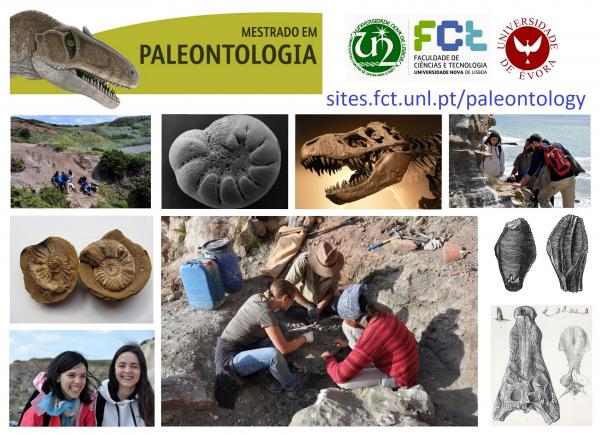MSc in Paleontology
Master in Paleontology
The Master in Paleontology programme is offered as a join association between FCT-UNL NOVA University of Lisbon (Faculty of Sciences and Technology) and University of Évora, in Portugal.
This is a supporting page of the Master in Paleontology programme. You can also follow the enroll page at https://www.fct.unl.pt/en/education/course/master-paleontology

Objectives
The overall objective of the course is to train postgraduate students with a comprehensive and integrated understanding of the current issues of the evolution of Earth and Life.
Despite the obvious added value in terms of quality and complementarity by the union of two universities in order to prepare a course of study, it is believed that this MSc will promote a set of cohesive lessons, worth employability and to act as protection and socio-economic recovery of the paleontological heritage. Apart from that, this MSc will fill a gap in terms of offering specific training in this area.
This Master course aims to achieve the following general objectives:
- Foster a continuous knowledge update in the exciting field of Paleontology;
- Develop research skills in paleontology;
- Provide a strong foundation and knowledge in the area of paleontology allowing the future graduates to make conscious initiatives regarding the paleontological / geological heritage.
Specific objectives:
- Expand training in the field of paleontology, in order to acquire sustainable foundations for the transmission of knowledge related to this scientific area;
- Acquiring scientific and technical training in the field of paleontology, allowing us to understand and solve new paradigms in multidisciplinary contexts, in particular for a better and more conscious performance of technical activities of classification and management of the natural environment, particularly the Paleontological the responsibility of public authorities (Ministry Environment, Spatial Planning and Regional Development, Ministry of Public Works, Transport and Communications Works and municipalities);
- Develop skills to integrate knowledge in complex geological settings;
- Develop a critical view of the fossil record and its importance for understanding the process of evolution;
- Analyze and discuss the biological aspects of the bodies from the past;
- Discuss and apply theories, concepts and paradigms in order to obtain a comprehensive and adequate view of the History of Earth and Life;
- Acquire skills and autonomy in formulating proposals to submit scientific projects, especially the national programs in the responsibility of the central and regional government. A country with a rich paleontological remains unexploited projects;
- Gain skills that provide the graduate with a high degree of autonomy to further develop and acquire a lifelong training in related disciplines and paleontology, with a high degree of autonomy.
Schedule:
Daytime, Presencial on campus at FCT-UNL (Caparica) and UÉ (Évora), Portugal.
Applications
1st phase: 1st may to 14th july
2nd phase: 26th to 31st august
Apply through the webpage https://www.fct.unl.pt/en/education/course/master-paleontology

